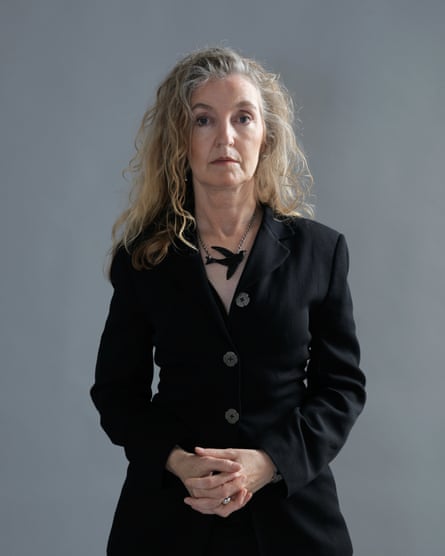When I was very young, some gay friends of mine threw a cross-dressing party. My boyfriend at the time, with the help of his mother, did so well that a lot of straight men were unnerved; they needed to know that the lust-inspiring, simpering siren in the tight slip was not compromising their heterosexuality. I was not nearly so convincing as a Rod Stewart-ish man with charcoal five o’clock shadow, and I was a little taken aback to realise that, to me, impersonating a man meant manspreading on the sofa, belching and scratching personal parts, glowering and cursing. There was a sense of not having to please anyone and not having to be likable that was fun, but it wasn’t necessarily someone I wanted to be.
I am old enough that girls weren’t allowed to wear trousers to school until midway through my elementary school education; that I remember a local newspaper columnist arguing in a grumpy panic that if women wore trousers gender would vanish, which he saw as a terrifying thing. I have worn jeans and shoes that are good for rough terrain for most of my life, along with lipstick and long hair, and being a woman has let me walk this line between what used to be considered masculine and feminine. But I have wondered from time to time what life would be like if I were a man. By this I don’t mean to aspire to, or appropriate, or suffer from gender dysphoria and the deeper issues around bodies, sexuality and sense of self that trans people contend with.
I like a lot of things about being a woman, but there are times and ways it’s a prison, and sometimes I daydream about being out of that prison. I know that being a man can be a prison in other ways. I know and love a lot of men, straight and gay, and I see burdens they’re saddled with that I’m glad not to carry. There are all the things men are not supposed to do and say and feel; the constant patrol on boys to prevent them from or punish them for doing anything inconsistent with conventions of heterosexual masculinity, those boys for whom, in their formative years, faggot and pussy – being not straight or not male – are still often the most sneering of epithets.
Back in the 1970s, when some men were figuring out how their own liberation might parallel women’s liberation, there was a demonstration at which guys held a banner that said, “Men are more than just success objects.” Perhaps as a girl, I was liberated by expectations that I’d be some variation on a failure. I could rebel by succeeding, while a lot of white middle-class men of my era seemed to rebel by failing, because the expectations had been set so very high for them. That had the upside of more support, sometimes, for their endeavours, but the downside of more pressure and higher expectations. They were supposed to grow up to be president, or their mother’s pride and joy, or their family’s sole support, or a hero every day – to somehow do remarkable things; being ordinary, decent and hardworking was often regarded as not enough. But success was available to them, and that was an advantage – and still is. We still have wild disproportions on those fronts; the New York Times reported in 2015 that “Fewer large companies are run by women than by men named John”. Among the top firms in the US, “for each woman, there are four men named John, Robert, William or James”.
Back when my mother was alive and well, I used to joke that my problem was that I was a perfect son. What my mother expected from me was, as far as I could tell, profoundly different from what she expected from her three sons. I used to joke that they were supposed to fix her roof; I was supposed to fix her psyche. She wanted something impossible from me, some combination of best friend confidante, nurturer, and person she could dump on about anything at any time – a person who would never disagree or depart. She lived about 20 miles north of San Francisco, where I’ve lived since I was 18, and I was willing to show up regularly, including holidays, Mother’s Day and her birthday, bring gifts, listen, be helpful in practical ways, while carrying on with my own life (I’d left home and become financially independent at 17).
As it was, she resented the opportunities I had that she felt she had not, starting with college, which she was not encouraged to go to, unlike her brother. This resentment is common, I think, between her generation and mine, and in some ways she saw my career as disrupting my proper role as her caregiver, or as a caregiver generally. I knew that the acceptable escape from being devoted to her was to devote my life to some other people – to get a husband, to have kids – rather than to be unavailable because I was working and living my own life. When I was young, she would recite to me the couplet “A son is a son till he takes him a wife, a daughter is a daughter all of her life.” In her expectations was an undertone of: I have sacrificed my life to others; sacrifice yours to me.
I’m not a sacrifice, but my work was a source of conflict for others as well. I started college early, graduated early, went onward to the Graduate School of Journalism at UC Berkeley, where I took a degree just before I turned 23, worked for a magazine, left the magazine and inadvertently found myself a freelance writer, which is largely how I’ve earned my living these past three decades. I published a book at 30, and then another one – 20 to date.

Early on in my friendship with an older feminist writer who has written many influential books, we used to laugh about the guys we met who were upset that we had published so much. They seemed to feel that they had to be more successful than whoever they were attracted to; that somehow our creative work was an act of aggression or competition. I don’t think women approach men the same way (though a novelist once told me his ex-wife made him feel like a race horse she was betting on). We joked, “If I knew I was going to meet you I would have burned the manuscripts.” Or as I’d laugh later, “Do you think this book makes my brain look big?” Boys can be stigmatised as nerds and geeks, but they can’t really be too smart. Girls can, and a lot of girls learn to hide their intelligence, or just abandon or devalue or doubt it. Having strong opinions and clear ideas is incompatible with being flatteringly deferential.
What is confidence in a man is too often viewed as competitiveness in a woman; what is leadership in a man is bossiness in a woman; even the word bossy, like slut or nag, is seldom applied to men. A few decades ago, I knew a woman who was a world champion martial artist. Her husband’s family was disconcerted by the fact that he could not beat her up. They did not suppose he wanted to, but they presumed he was somehow emasculated by not being able to, by the fact that she did not make him feel mighty in this abominable way. He himself, to his credit, did not seem to give a damn.
As a girl, I would have liked to have my intelligence and intellectual labours regarded as an unmitigated good and a source of pride, rather than something I had to handle delicately, lest I upset or offend. Success can contain implicit failure for straight women, who are supposed to succeed as women by making men feel godlike in their might. As Virginia Woolf reflected: “Women have served all these centuries as looking glasses possessing the magic and delicious power of reflecting the figure of man at twice its natural size.”
I have met a lot of brilliant men whose spouses serve their careers and live in their shadows, and marrying a successful man is still considered the pinnacle of women’s achievement in many circles. Some of those women flourished, but not a few seemed diminished by their role as helpmeet and handmaiden, and if they got divorced, they divorced the identity they’d helped build and maintain. There have been so many women who stayed at home and raised the kids while men went off on adventures and pursued accomplishments. There still are. These straight men with brilliant careers and families – no one asks them how they manage to have it all, because we know: she’s how.
Ms Magazine’s first issue in 1972 published a landmark essay titled Why I Want A Wife. It’s an appalling list of all the things a wife might do for her husband and children, of a woman as a sort of self-managed servant. Even recently, one of my best friends told me he’s taken aback at the smiles-and-compliments response to his going about in public with his new son, as if taking care of his kid is some sort of optional special credit he’s earning. It’s as though everything fathers do, economics aside, is bonus; nothing mothers do is enough. This is one of the reasons why a woman might want to be a man (and why choosing to have children can mean something entirely different for a woman than a man, unless she has that still-rare thing: a partner whose commitment to the work is truly equal). Were I a man, or had I a woman as partner, I might have made very different choices about marriage and children.

One often hears statements implying that it’s generous of a man to put up with a woman’s brilliance or success, though more and more straight couples are negotiating this as more women become principal breadwinners or higher earners (and Leonard Woolf was exemplary in his support for his wife’s work, which outshone his own). But growing up, I knew that I was supposed to be the audience rather than a participant, or the centre of attention.
I’ve written before about men explaining things – about that dynamic in which some men assume they know when they don’t, and that the woman they’re talking to doesn’t when she does. A 2008 essay I wrote on the topic never stopped circulating, apparently because it resonated for so many women and maybe some men. The word mansplaining now exists in more than 30 languages, according to an article this year, and I realise that built into the idea is a dynamic in which women are eternally the audience. There are no signs that mansplaining is going away. An acquaintance recently told me, “A man once asked me if I knew of the Bracero program [for Mexican farmworkers in the US], and when I said, ‘Why yes, I wrote my undergrad thesis about it,’ he replied, ‘Well, I’ll tell you about it.’ I said, ‘No, I’ll tell you, fucker!’ And then the dinner party got weird.”
Like most women, even after the age when strangers demanded I give them a smile, I’ve had complete strangers come up to me to unload their theories or stories at considerable length, without reciprocity in the conversation, if conversation is the term for this one-way street. We know the reality of this from studies about how boys are called on more in school, and grow up to talk more in meetings, and interrupt women more than men.
In the 1990s the artist Ann Hamilton gave her students lightweight 4ft by 8ft sheets of plywood to carry around everywhere they went for a week. The exercise made them conscious of navigating space; they were awkward, forever at risk of bumping into people and things, probably offering up a lot of excuses. Success sometimes seems like that for women, an awkwardly large thing that is supposed to be in other people’s way and for which you might need to apologise periodically. The phrases sometimes used for men who partner with successful women – taking it in his stride, not put out by, OK with, dealing with, cool with – are reminders that female success can be regarded as some kind of intrusion or inappropriate behaviour.
What would it feel like to have a success that does not in any way contain failure, that is not awkward or grounds for apology, something that you don’t need to downplay, to have power that enhances rather than detracts from your attractiveness? (The very idea that powerlessness is attractive is appalling – and real.) Ann Hamilton has had a tremendous career, and some of it came from the sheer scale and ambition of her work from the outset, which seemed exceptional when she appeared on the art scene in the late 1980s. I remember all the women art students I met in that era, who made tiny, furtive things that expressed something about their condition, including the lack of room they felt free to occupy. How do you think big when you’re supposed to not get in the way, not overstep your welcome, not overshadow or intimidate? Ann wrote to me when I asked about that plywood assignment long ago: “I am still trying to break the habit of apologising for myself – even though I have little hesitation in asking for help on projects – asking for myself brings out the old, ‘Please excuse me.’”

I know things are changing, and younger women have different experiences, but women older than me have horrifying stories to tell, and we are not out from under that shadow. Supreme court justice Ruth Bader Ginsburg says of her arrival at law school in the 1950s, “The dean then asked each of us in turn to say what we were doing at the law school, occupying a seat that could be held by a man.” Hillary Clinton told an interviewer a few years ago about meeting with similar opposition in the 1960s, from the young men who’d shown up to take the law school admissions test at Harvard when she did. One even accused her of being homicidal in her ambitions: “If you take my spot, I’ll get drafted, and I’ll go to Vietnam, and I’ll die.” He didn’t imagine she had a right to compete; or that the place that neither had yet won was no more his than hers. It’s not just trouble at the top: women plumbers, electricians and mechanics have told me about being treated as incompetent, intrusive or both in their field.
It isn’t hard to find contemporary horror stories of women who can’t wedge a word in edgewise at meetings, have their ideas taken up by others, don’t get promoted as they might if they were men, who get harassed and groped or, in the white-collar world, not invited to the executive bonding sessions. This year Silicon Valley has been haemorrhaging workers’ stories of sexual harassment and discrimination, and the gist of many is that the tech companies tolerate harassment more than they tolerate people who report it. Even this month a Google employee, in a now infamous screed, insisted that the deeply unequal landscape of Silicon Valley’s white-collar jobs is due to nothing more or less than men’s superior capacity.
We still have a long way to go. A young woman enrolled at a women’s college told me this summer she was thrilled to be in an intellectual habitat where no shining young men were going to dominate the classroom conversations the way they had in her high school; walking home across campus at 3am without thinking about safety was another pleasure. (Women do engage in sexual assault, but in numbers that are minute compared to those of men.) Women are targets in the online world, too; in a little experiment on Twitter last year, the journalist Summer Brenner borrowed her brother’s profile picture and turned her first name into initials – the harassment she had experienced online dropped to almost nothing. Women may aspire to be men just to be free from persecution by them.
If I were a man… I didn’t want to be someone else so much as I wanted, from time to time, to be treated as someone else, or left alone as I would be if I was something else. In particular, I’ve wanted to be able to walk around alone, in cities, on mountains, unmolested. You can’t wander lonely as a cloud when you’re always checking to see whether you’re being followed, or bracing yourself in case the person passing grabs you. I’ve been insulted, threatened, spat on, attacked, groped, harassed, followed; women I know have been stalked so ferociously they had to go into hiding, sometimes for years; other women I know have been kidnapped, raped, tortured, stabbed, beaten with rocks, left for dead. It impacts on your sense of freedom to say the least.
A small part of my consciousness is perpetually occupied by these survival questions whenever I’m outdoors alone, though there are a few places I’ve been – Iceland, Japan, extremely remote wildernesses where bears were the only menace – where I felt I didn’t have to think about it. Solitary walking is where a lot of writers – Wordsworth, Rousseau, Thoreau, Gary Snyder – got a lot of their thinking and composing done; I have, too, but it got interrupted both from outside and from this internal monitor, always thinking about my safety. I know that my whiteness tips the balance the other way with this; it lets me go places that a black person can’t, and the short answer to what my life might be like had I been born black would be: different in nearly every imaginable respect.
There are many stories of people cross-dressing not as self-expression, but for practical purposes, just as there are of people of colour passing as white. Deborah Samson and Anna Maria Lane are among the women who fought against the British in the revolutionary war dressed as men, and more women did the same in the Union Army during the civil war. The novelist George Sand used a man’s name to traverse the literary world of 19th-century France and then men’s clothes to traverse Paris. She wasn’t just hiding out from harassment, but putting away the treacherous shoes and yards of fabric that made it hard to walk through a city that was rough-surfaced and filthy. She traded those fragile things in for solid boots and sturdy clothes in which she could roam confidently in all weathers and times of day and night, and loved it. Sylvia Plath, born a century later, wrote in her journal when she was 19 that, “Being born a woman is my awful tragedy. Yes, God, I want to talk to everybody I can as deeply as I can. I want to be able to sleep in an open field, to travel west, to walk freely at night.”

Not a little of the stuff women wore, and still wear, is an impediment and a confinement. Some women evacuating the World Trade Center on September 11 did so barefoot, lacerating their feet because their shoes impaired their mobility. What is it like to spend a lot of your life in shoes in which you’re less steady and swift than the people around you? Some women wear tight clothes that hamper free movement, fragile clothes, clothes you can trip over. These garments can be fun and glamorous, but as an everyday uniform they’re often incapacitating.
Trans people have been remarkable witnesses to how differently the world treats them when they transition. I have read many stories of a woman finding that she no longer has the right of way but will be bumped into on the street; a man finding that he is no longer interrupted. Gender shapes the spaces – social, conversational, professional, as well as literal – that we are given to occupy. Who we are, I realised as I co-created an atlas of New York City, is even built into the landscape, in which many things are named after men, few after women, from streets and buildings – Lafayette Street, Madison Avenue, Lincoln Center, Rockefeller Center – to boroughs – nearby Paterson, Levittown, Morristown. The nomenclature of the city seemed to encourage men to imagine greatness for themselves as generals, captains of industry, presidents, senators. My collaborators and I made a map in which all the subway stops in New York were renamed after the city’s great women. Last year, when I discussed it with students at Columbia university (named after Christopher Columbus, of course), a young woman of colour remarked that she had slouched all her life; that in a city where things were named after people like her she might stand up straight. Another wondered whether she would be sexually harassed on boulevards named after women. The world is an uneven surface, with plenty to trip on and room to reinvent.
I like being a woman. I love watching and maybe smiling at or talking to kids I run into in parks and grocery stores and anywhere else; I’m confident no one will ever take me for a creep or a kidnapper, and I know that it would be more complicated if I were a man. There are more subtle advantages about the range of expression I’m allowed in my personal relations, including in my close, supportive, emotionally expressive friendships with other women – and, through all my adult life, my friendships with gay men, many of whom who have boldly, festively, brilliantly broken the rules of masculinity and helped me laugh at the gaps between who we are and who we’re supposed to be. Liberation is a contagious project, and growing up around people who took apart and reassembled gender helped liberate even a straight woman like me.
So I don’t wish I were a man. I just wish we were all free.
The Mother Of All Questions is published by Granta on 7 September at £12.99. To order a copy for £9.74, go to bookshop.theguardian.com or call 0330 333 6846. Rebecca Solnit will be speaking at Southbank Centre’s London Literature festival on 30 October.

Comments (…)
Sign in or create your Guardian account to join the discussion